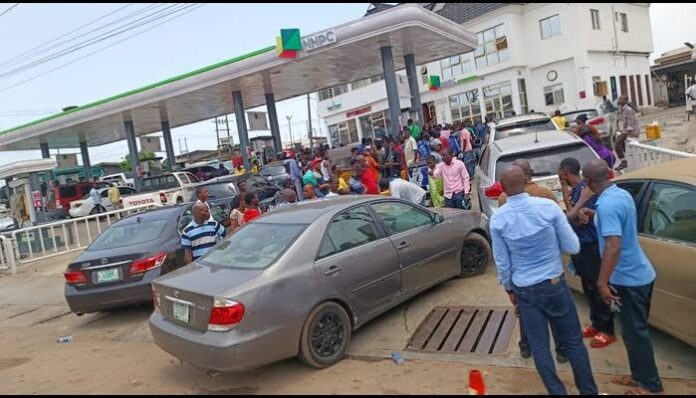President of the Petroleum Products Retail Outlets Owners Association (PETROAN), Billy Gillis-Harry, passionately addressed the ongoing fuel scarcity issue in Abuja, Nasarawa, and other states.
In an interview, Gillis-Harry shed light on the underlying cause of the crisis, pointing fingers at the Nigerian National Petroleum Company Limited (NNPCL) for the non-supply of Premium Motor Spirit (Petrol).
Amidst the re-emergence of long queues at filling stations across the nation, Gillis-Harry expressed his frustrations during his search for fuel.
He highlighted that fuel marketers, including PETROAN members, are unable to set prices due to their reliance on the NNPCL for supply. The scarcity and subsequent price fluctuations are a direct result of the unavailability of the product in the market.
Recent reports indicate that fuel queues have resurfaced in Abuja and neighboring Nasarawa, causing inconvenience to motorists. Filling stations along major routes, such as the Kubwa Expressway, Lugbe, and Airport Road, were devoid of fuel, leaving drivers in a state of bewilderment.
Gillis-Harry also addressed concerns regarding the upcoming Dangote refinery, stating that it has not contributed to the current fuel supply challenges.

He emphasized that Nigerians depend heavily on Petrol and expressed pride in the prospect of having a refinery with a daily capacity of 650,000 barrels in the country. However, he urged the NNPCL to improve its supply capabilities and avoid relying solely on a few retail filling stations.
Furthermore, the National Bureau of Statistics recently reported a rise in the average price of Petrol per liter in May 2024, reaching N769.62.
This increase follows the removal of fuel subsidies in June of the previous year, which caused pump prices to soar from N238.11 to around N700 per liter.
In conclusion, Gillis-Harry called upon the NNPCL to address the supply challenges promptly, urging all major stakeholders to collaborate and stay informed to prevent similar fuel crises in the future. The nation’s reliance on Petrol calls for a robust and efficient supply chain to meet the daily demands of Nigerian citizens.




